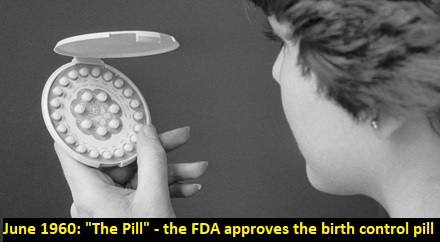Introduction:
The approval of the birth control pill by the United States Food and Drug Administration (FDA) administration on June 23, 1960 marked a key moment in US – and world – history. This revolutionary oral contraceptive method, then called “Enovid” and manufactured by G.D. Searle and Company not only empowered women with reproductive autonomy but also catalyzed profound social, economic, and cultural transformations. The era of so-called “Free Love” had begun! The significance of this milestone extends far beyond its immediate medical implications, reshaping attitudes towards sexuality, gender roles, and women’s rights. This essay explores the multifaceted importance of the FDA approval of the birth control pill in 1960.
Empowerment of Women:
The birth control pill fundamentally altered the landscape of reproductive rights, granting women unprecedented control over their fertility. For the first time, women could plan their pregnancies, pursue educational and professional aspirations, and make autonomous decisions about their bodies. By providing a safe, effective, and convenient contraceptive method, the pill liberated countless women from the constraints of unintended pregnancies, empowering them to assert greater autonomy in both their personal and public lives.
Economic Empowerment:
Access to reliable contraception has been instrumental in advancing women’s economic opportunities. With the ability to plan pregnancies, women could enter the workforce, pursue higher education, and participate more fully in economic activities. The birth control pill facilitated greater financial independence, allowing women to contribute significantly to household incomes and reducing their dependence on traditional gender roles. Moreover, by delaying childbirth and spacing out pregnancies, the pill contributed to improved maternal and child health outcomes, further enhancing economic productivity and stability.
Health and Well-being:
Beyond its role in family planning, the birth control pill has provided numerous health benefits for women. It has been instrumental in the management of various gynecological conditions, such as menstrual irregularities, polycystic ovary syndrome (PCOS), and endometriosis. Additionally, the pill has been associated with a reduced risk of certain cancers, including ovarian and endometrial cancer (although possibly providing a small increase in breast cancer risk). By offering the mentioned health benefits, the pill not only improved the quality of life for countless women but also contributed to overall public health outcomes.
Social and Cultural Shifts:
The introduction of the birth control pill sparked profound social and cultural transformations (For example: Woodstock and “Free Love” in 1969), challenging traditional norms surrounding sexuality and gender roles. “The Pill” played a key role in the sexual revolution of the 1960s, fostering greater openness and acceptance of premarital sex and non-procreative relationships. Moreover, by enabling women to separate sex from reproduction, the pill facilitated more egalitarian partnerships and paved the way for greater gender equality. It catalyzed discussions about reproductive rights, women’s autonomy, and the broader quest for social justice.
Continued Challenges and Opportunities:
Despite its transformative impact, access to contraception remains a contested issue globally. Socioeconomic disparities, cultural barriers, and political as well as religious ideologies continue to sometimes impede universal access to contraception, limiting its potential to empower individuals and promote reproductive health. Addressing these challenges requires comprehensive strategies that prioritize education, advocacy, and policy reform to ensure equitable access to contraception for all individuals.
Conclusion:
The 1960 FDA approval of the birth control pill stands as a landmark moment in history, heralding a new era of reproductive freedom, economic empowerment, and social change. By providing individuals with greater control over their fertility, the pill has revolutionized attitudes towards sexuality, reshaped gender dynamics, and expanded opportunities for women worldwide. However, the journey towards universal access to contraception and reproductive justice remains ongoing, underscoring the need for continued advocacy and action to build a more equitable and inclusive society.

